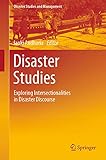Disaster Studies [electronic resource] : Exploring Intersectionalities in Disaster Discourse / edited by Janki Andharia.
Material type: TextSeries: Disaster Studies and ManagementPublisher: Singapore : Springer Singapore : Imprint: Springer, 2020Edition: 1st ed. 2020Description: XXXI, 462 p. 60 illus., 45 illus. in color. online resourceContent type: text Media type: computer Carrier type: online resourceISBN: 9789813293397Subject(s): Environmental sociology | Natural disasters | Environmental law | Environmental policy | Environmental management | Human geography | Environmental Sociology | Natural Hazards | Environmental Law/Policy/Ecojustice | Environmental Management | Environmental Politics | Human GeographyAdditional physical formats: Printed edition:: No title; Printed edition:: No title; Printed edition:: No titleDDC classification: 333.7 LOC classification: GE195Online resources: Click here to access online
TextSeries: Disaster Studies and ManagementPublisher: Singapore : Springer Singapore : Imprint: Springer, 2020Edition: 1st ed. 2020Description: XXXI, 462 p. 60 illus., 45 illus. in color. online resourceContent type: text Media type: computer Carrier type: online resourceISBN: 9789813293397Subject(s): Environmental sociology | Natural disasters | Environmental law | Environmental policy | Environmental management | Human geography | Environmental Sociology | Natural Hazards | Environmental Law/Policy/Ecojustice | Environmental Management | Environmental Politics | Human GeographyAdditional physical formats: Printed edition:: No title; Printed edition:: No title; Printed edition:: No titleDDC classification: 333.7 LOC classification: GE195Online resources: Click here to access online Chapter 1: Thinking about Disasters: A call for intersectionality and transdisciplinarity in disaster studies -- Chapter 2: Blurred boundaries, shared practices: Disaster studies and disaster management as an emerging discipline and a field of practice -- Chapter 3: The Need for Comparative Research in Disaster Studies: Developing Broader Theories from Research -- Chapter 4: Setting a Public Policy Agenda for Disaster Research in India -- Chapter 5: An unusual toofan : Governance of Communal Violence and Disaster Management in Gujarat -- Chapter 6: Maritime-Logistics in National and Regional ‘Humanitarian Assistance and Disaster Relief’ (HADR) -- Chapter 7: Building Disaster Resilience through Sustainable Housing: An Initiative in Meghalaya -- Chapter 8: Women and the Gender Bias of Disasters: When Vulnerabilities Converge -- Chapter 9: Reintegrating the "Other". Challenges of stigmatization in policies and practice: The case of Ebola survivorsand their relatives during the 2014-2016 epidemic -- Chapter 10: One size fits all? Polemics of Disaster Management from the perspective of post Tsunami experiences of the Nicobari Islanders -- Chapter 11: Towards Measuring Resilience of Low Income Settlements in Cities: The Case of Mumbai: Index for Vulnerable Communities in Mumbai.
This book covers several dimensions of disaster studies as an emerging discipline. It is the inaugural book in the series ‘Disaster Studies and Management’ and deals with questions such as “Is disaster management a field of practice, a profession, or simply a new area of study?” Exploring intersectionalities, the book also examines areas of research that could help enhance the discourse on disaster management from policy and practice perspectives, revisiting conventional event-centric approaches, which are the basis for most writings on the subject. Several case studies and comparative analyses reflect a critical reading of research and practice concerning disasters and their management. The book offers valuable insights into various subjects including the challenge of establishing inter- and multi-disciplinary teams within the academia involved in disaster studies, and sociological and anthropological readings of post-disaster memoryscapes. Each of the contributors has an enduring interest in disaster studies, thus enriching the book immensely. This book will be of interest to all the students and scholars of disaster studies and disaster management, as well as to practitioners and policymakers.
